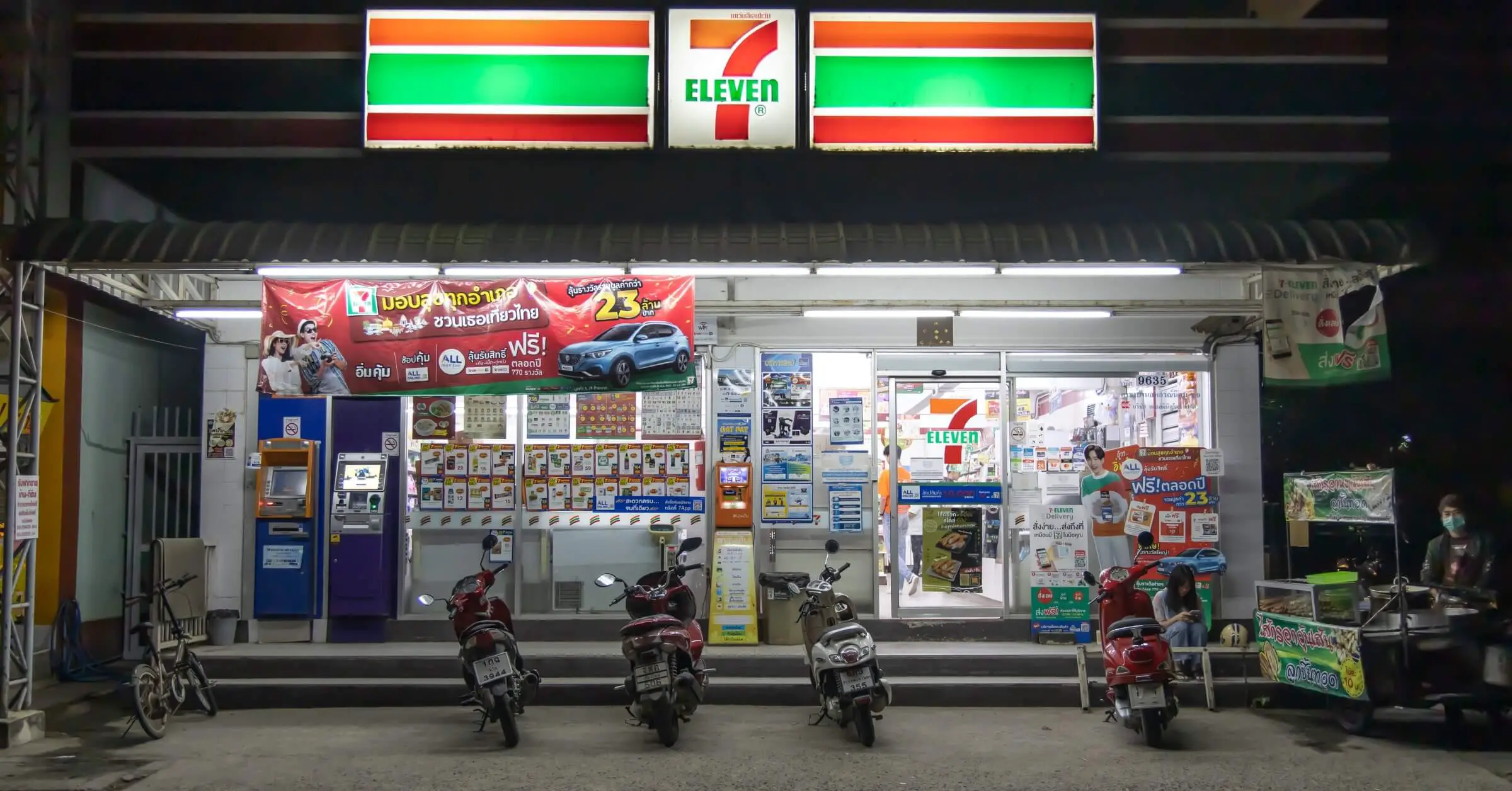
Key Takeaways:
- 7-Eleven is a global brand recognized locally and internationally, known for its quality products, services, cleanliness, and value. It is considered a benchmark for retail innovation and technology in the convenience store industry.
- Becoming a 7-Eleven franchisee in the Philippines is a profitable business opportunity, and investors can contract franchisees from big brands like 7-Eleven. The franchise fee and total investment range from P1 Million to P5 Million, which includes construction costs, supplies, initial products, franchise fees, and lease payments.
- The franchise process includes seven steps: Initial Contact, Pre-Qualification, Preparation of Business Plan, Interview with the Approval Committee, Memorandum of Agreement Signing, Training, and Store Opening and Turnover. Training programs and ongoing support are provided to franchisees to ensure success and maximize profitability.
Introduction to 7-Eleven franchise in the Philippines
With over 2,800 stores nationwide, 7-Eleven is a major player in the convenience store chain industry in the Philippines. In this section, we will explore the reasons why 7-Eleven is a profitable business opportunity in the country and what sets it apart from other franchise options. We will also provide insights into the current market trends and the growth potential of the convenience store chain industry in the Philippines.
The convenience store chain industry in the Philippines
The convenience store sector in the Philippines is growing fast. 7-Eleven is at the forefront of this market. Thanks to higher disposable incomes and the need for convenience in the fast-paced Filipino lifestyle, the sector is flourishing.
People flock to these shops for their hassle-free and quick purchase option of everyday items, meals, snacks, and even bills. 7-Eleven has an extensive network of over 3,000 stores open 24/7 all over the country. Investing in 7-Eleven Philippine Holdings is seen as a golden opportunity.
Convenience stores, unlike traditional grocery stores, focus on quick products like meals, single-serve drinks, and snacks. They also provide services like financial transactions and deliveries. The convenience store chain industry in the Philippines is booming – one to keep an eye on!
Why 7-Eleven is a profitable business opportunity in the Philippines
7-Eleven is a successful venture in the Philippines. There are many reasons why. Firstly, its strategic locations, stocked shelves, and efficient supply chain management system have made it profitable. Secondly, its 24/7 availability caters to the hectic lifestyle of Filipinos and has made 7-Eleven a top player in the retail industry.
Moreover, its marketing and branding campaigns have helped with its growth. Quality products at affordable prices have established its reliability.
Furthermore, 7-Eleven offers franchising opportunities. It has an established business model and provides franchisees with training, operational support, and marketing assistance.
Thanks to its brand name, franchising, and innovation, 7-Eleven is a lucrative opportunity in the Philippines. So, anyone seeking a profitable business should consider this convenience store chain.
Requirements and steps to franchise a 7-Eleven store in the Philippines

Are you planning to franchise a 7-Eleven store in the Philippines? Look no further as this section provides all the essential information on the legal requirements and steps to start your franchise process. It is crucial to meet the specific legal requirements to get your franchise up and running, including the steps involved in the process for 7-Eleven stores in the Philippines.
Take the first step towards running your own 7-Eleven franchise and make sure you are aware of all the necessary legal requirements for a successful franchise operation.
Legal requirements to franchise a 7-Eleven store in the Philippines
Franchising a 7-Eleven store in the Philippines requires comprehending and following legal requirements. Philippine law mandates that franchisors must register with the SEC and submit offering circulars for evaluation. Plus, they must have a Franchise Disclosure Document (FDD). This includes info like financial statements and background/experience of key employees/board of directors.
To meet these requirements, potential franchisees must review existing franchise laws and study 7-Eleven’s regulations. They must also secure permits and licenses before launching the business. Furthermore, they must process legal documents such as TINs & permits from regulatory bodies before renovating or building.
Aside from legal conditions, prospective franchisees must meet non-legal conditions to become an official 7-Eleven franchisee. This includes a successful business record, a positive attitude towards 7-Eleven’s systems & protocols, and sufficient startup capital. The cost of starting up varies based on store size. Nevertheless, having a 7-Eleven franchise is a highly lucrative opportunity in the Philippine retail industry.
Steps in the franchise process for 7-Eleven stores in the Philippines
If you want to franchise a 7-Eleven store in the Philippines, there’s a 5-step guide for you to follow. This is to make sure that all potential franchisees can handle running a 7-Eleven store and maintain its quality.
- Submit your application on their website or at a store.
- Attend an Orientation Seminar. It’ll tell you about the costs, places, legal stuff, and expectations.
- Give the company the documents they need, plus a site selection proposal and fees.
- Get training through lectures and a hands-on experience at any 7-Eleven.
- Meet with the Franchise Manager to pick your spot.
You must pass each step of the review before going to the next one. As a franchise owner, you must respect Philippine labor laws. So, keep up with compliance issues to have a profitable and legal business.
Types of franchising arrangements between businesses
In the world of business, franchising has become a popular way for entrepreneurs to expand their brand and reach more customers. Franchising can take on many forms, including product-distribution franchises, business-format franchises, and management franchises. In this section, we will explore various franchising business models used in the industry, and take a closer look at the specific franchise model used by 7-Eleven stores in the Philippines.
With over 2,700 7-Eleven stores in the Philippines, this franchise model has proven to be successful in the country’s retail market. As the number of franchises continues to grow in the Philippines, it is crucial to have a clear understanding of the franchising landscape.
Franchising business models
Franchising offers numerous business models. One of them is area development. With this option, franchisees can own multiple stores in a designated area. It can bring benefits like discounted fees and marketing support.
To make sure the relationship between franchisor and franchisee works, clear guidelines have to be set. Good communication and following the procedures is essential. With the right understanding and cooperation, franchisors and franchisees can both succeed.
Franchising arrangements for 7-Eleven stores in the Philippines
7-Eleven, a beloved convenience store chain, has franchising arrangements in the Philippines. To show these possibilities, a table can be utilized.
According to facts, there are two franchise options given by 7-Eleven in the Philippines – the traditional franchise model and the business conversion model.
The traditional franchise model demands franchisees to search for a spot, get a lease agreement, and set up store operations. This has a standard franchise term of ten years and a renewal option. The business conversion model, however, is great for existing retail businesses that want to become a 7-Eleven store. This has a shorter contract of five years and requires less capital in comparison to the traditional franchising.
Aside from these choices, 7-Eleven also provides financing solutions for qualified investors. These incorporate equipment leasing and financing for initial inventory costs.
In conclusion, interested franchisees in the Philippines can select between the traditional or business conversion models presented by 7-Eleven and gain access to financing options given by the company itself.
Investment, training, and support for 7-Eleven franchisees
Investing in a 7-Eleven franchise in the Philippines can indeed be a lucrative opportunity for entrepreneurs. However, proper training and support are crucial to achieving success in this business. In this section, we will provide details on the investment required to franchise a 7-Eleven store in the Philippines, as well as the extensive training program that all franchisees must undergo.
We will also examine the different types of support that 7-Eleven franchisees can receive, including marketing assistance and ongoing operational guidance.
Investment required to franchise a 7-Eleven store in the Philippines
Taking a deeper look into franchising a 7-Eleven store in the Philippines, let’s highlight the cost and investment needed. This is important to know, so potential franchisees understand how much capital is required to start the venture.
A table is provided for a better overview of fees and costs:
| Category | Cost |
|---|---|
| Franchise Fee | PHP1,000,000 ($20,500) upfront fee |
| Security Deposit | PHP300,000 ($6,150) refundable deposit when terminating the agreement |
| Store Location | Range from PHP3 million ($61,500) to PHP25 million ($512,500) depending on size & location |
| Initial inventory | Typically between PHP1 million ($20,500) and up |
The primary expense that all franchisees must pay is an upfront franchise fee of PHP1 million ($20,500). Plus, a refundable security deposit of around PHP300k ($6.15k) is required when they end the agreement.
Also, it is important to note that securing an appropriate store location is a major investment that greatly affects sales volume. Rental/leasing costs may range from approximately PHP3 million ($61.5k) to upwards of PHP25 million ($512.5k), depending on factors such as location and size. Lastly, the initial inventory usually requires an investment between Php 1M and up.
To conclude, the investment for franchising a 7-Eleven store in the Philippines varies based on different formats and factors.
Training program for 7-Eleven franchisees in the Philippines
Want to become a winning 7-Eleven franchisee in the Philippines? You’ll have to go through an intensive training program! This program is designed to give franchisees the knowledge and skills they need to manage a prosperous convenience store. It covers areas such as store management, merchandising, accounting, customer service, and product knowledge. It provides franchisees with a complete grasp of the 7-Eleven business model.
The program has a mix of classroom teaching and on-site practical exercises. Franchisees get to practice staffing, inventory management, and marketing strategies. They also get advice from experienced 7-Eleven operations team members, so they’ll be ready for any situation that crops up while running their store.
Plus, the curriculum includes special training in crisis management and security protocols. This ensures that franchisees are equipped to handle any issues that come up while managing their stores.
7-Eleven makes sure their franchisees have all the tools they need to succeed and make their investment worthwhile. If you’re seeking a successful franchising opportunity in the Philippines, the 7-Eleven training program is the ideal place to start!
Support for 7-Eleven franchisees in the Philippines
7-Eleven supports their franchisees in the Philippines with multiple forms of aid. They provide financial help and access to supplies from certified suppliers. Furthermore, 7-Eleven offers a training program. It encompasses topics from inventory control to customer service and many other management strategies. It even includes classroom and practical instruction, customized for each franchisee’s needs.
The consultants connected to 7-Eleven offer lots of help throughout the business’s life cycle. They make sure the franchisees reach the company’s objectives and follow its principles. Moreover, if disputes arise between the company and a franchisee, 7-Eleven provides arbitration services to peacefully settle the issue. To sum it up, 7-Eleven truly offers substantial assistance to their Philippine franchisees.
Five Facts About How To Franchise 7-Eleven In The Philippines:
- ✅ The Philippine Seven Corp. (PSC) acquired the license agreement to use the 7-Eleven Convenience Store system in the Philippines in 1982. (Source: https://www.franchisemarket.ph/franchise-listing/7-eleven)
- ✅ 7-Eleven opened its first store in Quezon City in 1984 and reached its 100th store in 1996. (Source: https://www.7-eleven.com.ph/faqs/)
- ✅ 7-Eleven has aggressively expanded its empire in the Philippines, with a total of 2,287 stores nationwide, of which 1,033 are owned by the company directly. (Source: https://filipinowealth.com/how-to-franchise-7-11-in-the-philippines/)
- ✅ The franchise fee and total investment range from P1 Million to P5 Million, which includes construction costs, supplies, initial products, franchise fees, and lease payments. (Source: https://franchisemanila.com/2013/07/7-11-franchise/)
- ✅ The franchise process includes 7 steps: Initial Contact, Pre-Qualification, Preparation of Business Plan, Interview with the Approval Committee, Memorandum of Agreement Signing, Training, and Store Opening and Turn Over. (Source: https://7-eleven-old.qairos.asia/franchising/application-information/)
FAQs about How To Franchise 711 In The Philippines
About 7-Eleven Philippines
7-Eleven is a global brand that is recognized locally and internationally for its products, quality, service, cleanliness, and value. It is considered a benchmark for retail innovation and technology in the convenience store industry. Philippine Seven Corp. (PSC) acquired the license agreement to use the 7-Eleven Convenience Store system in the Philippines in 1982. In 1984, PSC opened its first store in Quezon City and reached its 100th store in 1996. In 1998, PSC opened its doors to franchising and has won numerous awards from the Philippine Franchise Association and Entrepreneur Philippines.
Franchising a 7-Eleven Store in the Philippines
To start the process of franchising a 7-Eleven store in the Philippines, visit their official website and click on the “franchising” tab under the “corporate” section. You can also schedule a Franchise Briefing by filling out the online inquiry form or contacting the Philippine Seven Corporation directly. Requirements for franchising a 7-Eleven store in the Philippines are not specified in the articles, but potential franchisees must be willing to invest in the business and be directly involved in daily operations.
Franchise Package and Process
The franchise fee and total investment range from P1 Million to P5 Million, which includes construction costs, supplies, initial products, franchise fees, and lease payments. The franchise package includes a 4-8 week training program in the classroom and an actual store, showing the standard operation and management of a 7-Eleven store. It also offers support for product development, store maintenance, and bookkeeping services. The franchising process for 7-Eleven Philippines includes seven steps: Initial Contact, Pre-Qualification, Preparation of Business Plan, Interview with the Approval Committee, Memorandum of Agreement Signing, Training, and Store Opening and Turn Over. The process takes several months to complete and involves a series of interviews and selecting a location for the store.
Is Franchising a 7-Eleven Store in the Philippines a Guarantee of Success?
Franchising is not a guarantee of success, and mistakes can cost millions of pesos. However, 7-Eleven is a globally recognized brand known for its innovative retail technology and quality service, making it a promising franchising business in the booming Philippine market. Fast-food chains like Jollibee and McDonald’s, as well as franchises like 7-Eleven, have seen tremendous growth in the Philippines.




